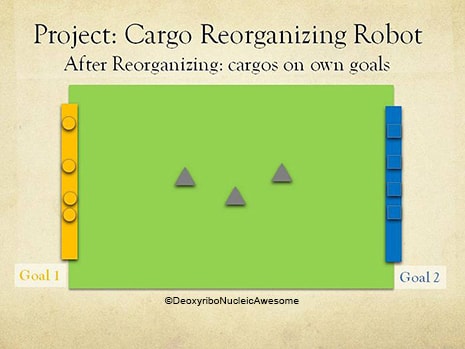Undergraduate research team from Caltech makes contribution to molecular robotics literature
Orange County, CA - January 24th 2017 - A team of researchers from the California Institute of Technology were able to develop a robotic system capable of sorting and delivering structures, or cargo, into desired locations on a 2D nanoscale surface. The robots, or walkers, demonstrated the autonomous organization skills used to locate and bind to DNA identifiers, and then later unbind at their intended destination. The walker then continues to explore and interact with the environment, eventually fulfilling its task. Previous robots entrusted with such tasks were not as advanced and such research boosts experimental research on molecular robots.
The nanoscale walker is a simple 48 nucleotide single strand of DNA able to maneuver the 2D nanoscale surface through Toehold-Mediated Strand Displacement. Each end of the walker’s body contains a toehold with the objective of pursuing a complimentary strand from the traversed course.
The walker goes on to further explore the surface at random until it finds a structure carrying the corresponding DNA identifier that has the same toehold. Binding to that structure, it continues its explorations along the track until finding the goal location. With the goal location and cargo having the same toehold the hand off is then complete. Although a single walker is able to sort each cargo by itself, several copies of the same walker are able to accelerate this process.

This technology is able to be harnessed for a number of applications. Other mechanisms used in conjunction could create systems that automatically collect and remove byproducts from a reaction, purify a system and condense products, or aid in controlled nanoscale assembly machines. Their method of organization is also universal in that it can be applied to anything tagged with a DNA identifier.
Proving that all mechanisms were used and functional in the solution, the team hopes to test the sorting mechanism that binds the DNA. This step adds a layer of complexity, but the researchers are prepared for the various trials ahead of them. Their research has significantly expanded the literature on molecular robotics and the team has long term plans of potentially developing, “the most sophisticated DNA robot built as of yet,” as described on their website.
To learn about their research visit their site here.
Contact Ampronix:

Email: info@ampronix.com
International Sales: +1 949-273-8000
Domestic Sales: 1800-400-7972 for US and Canada
Follow Us:
Share This Article:
View our Product Catalog Online Here
About Ampronix
Ampronix is a renowned authorized master distributor of the medical industry's top brands as well as a world-class manufacturer of innovative technology. Since 1982, Ampronix has been dedicated to meeting the growing needs of the medical community with its extensive product knowledge, outstanding service, and state-of-the-art repair facility. Ampronix prides itself on its ability to offer tailored, one-stop solutions at a faster and more cost-effective rate than other manufacturers. Ampronix is an ISO & ANSI/ESD certified facility. To learn more go here.
Undergraduate research team from Caltech makes contribution to molecular robotics literature Orange County, CA – January 24th 2017 – A team of researchers from the California Institute of Technology were able to develop a robotic system capable of sorting and delivering structures, or cargo, into desired locations on a 2D nanoscale surface. The robots, or walkers, demonstrated […]



